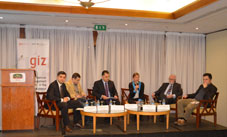
International conference on value-for-money in the public sector
Wednesday, December 11
On 5 December, the State Audit Office of Georgia (SAO) and the Deutsche Gesellschaft fur Internationale Zusammenarbeit (GIZ) held a joint conference on „Value-for-money in the Public Sector“. The conference discussed how the public administration can use scarce public resources more efficiently in order to improve public service delivery and ensure that taxpayers receive a good value for their money. Consensus was reached that new tools for budget planning and execution, and enhanced accountability carry potential to achieve these goals. High-profile speakers including the Auditor General Lasha Tordia, Deputy-Minister of Finance Giorgi Tabuashvili, Chairman of the Budget and Finance Committee David Onoprishvili and a number of experts from the EU Delegation, Germany, Slovenia and Sweden agreed that value-for-money principles should be firmly rooted in the country`s Public Financial Management (PFM) reform endeavors.
The conference was held against the background of the recent reforms in the SAO to introduce performance audit, a new approach by which the SAO examines the economy and efficiency of public spending. In other words, the SAO scrutinizes how reasonable and efficient the administration uses public resources and whether it can achieve its goals with fewer resources. Performance audit thereby serves to enhance value-for-money and helps the administration to improve its operations and service delivery. It was stressed that this approach embodies the SAO`s transformation towards a modern audit office that acts as an independent advisor to the Parliament and government, leaving behind a controlling and punitive culture.
On behalf of the German Federal Ministry for Economic Cooperation and Development (BMZ) GIZ supports the SAO in its reform efforts to introduce modern audit techniques and improve reporting capacities. With the support of international experts, the SAO has published its first performance audit reports and presented them to Parliament. However, while performance principles are a benchmark for audit, the SAO faces the challenge that these principles are not explicitly anchored in budget planning and execution. Financial impact assessments are rarely used in the Georgian public administration prior to making a spending decision as a tool to weigh up between the different spending alternatives. Since in most cases the SAO only audits ex-post, it can then only recommend how to increase performance and save resources in the future. Experience shared by international experts suggests that anchoring value-for-money principles firmly at all stages of the budget cycle, be it through legal provisions or guidelines, is an effective way of strengthening efficiency in public finance. The conference also discussed how SAO reforms can contribute to improved accountability and financial oversight. Strengthening its independence and professionalism are important prerequisites for this. At the same time, the SAO needs to communicate its role as an independent institution that audits and reports to Parliament, but has no investigative or executive power. Both the Budget and Finance Committee of Parliament and the Ministry of Finance confirmed their commitment to support SAO reforms and to increase cooperation among the institutions in the future.



